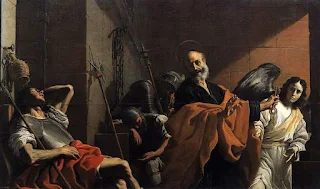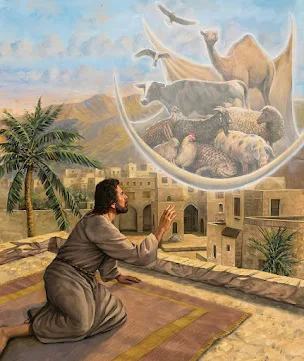Reflections on the GOSPEL. Creation, fall, redemption, restoration /consummation /recreation. Inclusive and exclusive. Tabernacle and presence.
Loved by God.

- UBF Gospel Musings
- Chicago, IL, United States
- * It's good to suffer loss, for it draws me to the Cross where God's loss is more than what anyone ever lost. * We cannot hear what the stories of the Bible are saying until we hear them as stories about ourselves. * Let go of control. * Trust God. Thank God. Think about God. Talk to God. Talk about God.
Saturday, February 18, 2023
Friday, February 17, 2023
Persecution, Prayer and Deliverance (Acts 12:1-24)
Acts 12 is one of the most colorful and entertaining narratives in all of Acts with the humorous scene where Peter is prodded by an angel to put on his clothes (Ac 12:8), and how later he was left standing and locked out at the gate of the home of his Christian friends by an excited gatekeeper (Ac 12:13-14) after having been led through numerous gates manned by his captors (Ac 12:9-10)!
Wednesday, February 15, 2023
When Christians were First Called Christians (Acts 11:1-30)
- How should the church in Jerusalem have received the news of "the Gentiles [receiving] the word of God" (Ac 11:1, 23)? Why were "the circumcised believers" critical of Peter (Ac 11:2-3; Lk 5:30; 15:2; 19:7)? What did they expect of Gentile converts (Ac 15:1, 5; Gal 2:11-14)?
- What can we learn from Peter's response to their criticism (Ac 11:4-17)?
How the early Christians described themselves. They spoke of being
- disciples,
- believers,
- saints,
- brothers and sisters,
- Nazarenes (Ac 24:5), or
- followers of the "Way."
By being "called Christians" (Ac 11:26), Luke is indicating that the followers of Jesus were first perceived to be a group clearly distinct from Jews in Antioch. He wants his audience to be able to distinguish Christians (both Jews and Gentiles) from Jews who are not followers of Christ. Thus, this distinction is not ethnic but social on the basis of adherence or religious loyalties.
Tuesday, February 14, 2023
Present Suffering and Future Glory (Romans 8:18-39)
Key Verse: "I consider that our present sufferings are not worth comparing with the glory that will be revealed in us" (Rom 8:18).
- How did Paul view present sufferings and future glory (Rom 8:18)? What does the creation expect (Rom 8:19)? Why does creation suffer (Rom 8:20; Gen 3:17-18)? For what does it groan in hope (Rom 8:21-22)?
- Read Rom 8:23. How does Paul describe believers? For what do we groan inwardly (Php 3:20-21)? What is our true hope and how does it enable us to wait patiently (Rom 8:24-25; Jn 16:33))?
- What are our weaknesses, and how do they affect our prayer (Rom 8:26a; 7:18-20)? Who helps us and how (Rom 8:26b-27; 1 Cor 2:10-14)? Why is the Spirit's intercessory prayer effective?
- What conviction do believers have, and on what basis (Rom 8:28)? What is the good which God works for (Rom 8:29-30)? How does Paul describe the process of God's work in a believer's life?
- What does Paul emphasize in his rhetorical questions in Rom 8:31-35? What problems do we confront and how can we overcome them?
- How should believers regard sufferings (Rom 8:36)? What does it mean to be "more than conquerors" (Rom 8:37)? Who tries to separate us from God's love, and why can they not (Rom 8:38-39)?
Exclusivity and Inclusivity (Acts 10)
- How can you be both exclusive (Jn 14:6; Mt 11:27; Lk 10:22; Ac 4:12; Eph 3:12; Heb 10:20) and inclusive (Jn 3:16; Mt 5:45)--like Jesus (Mt 5:46-48; 1 Cor 5:21)? What happens when you're exclusive or inclusive or both?
- As Cornelius and Paul encountered God (Ac 10:3, 13), has God ever "said" or shown anything to you? How do you "hear" or "listen" to God (Ps 1:2; 119:97)?
- Why did Cornelius call together his relatives and close friends (Ac 10:24)? Should one with a higher status expect to be honored more than others (Ac 10:25-26; Jas 4:10; Mt 11:29)?
- How many Acts messages by Peter are there (Ac 2:14-39; 3:12-26; 4:8-12? How does God show no favoritism (Ac 10:34; Mt 5:45)? How can we (Mt 5:46-48)? How should we regard others (Dt 10:17-19; Ac 10:28, 34; Gal 3:28)? Who does God accept (Ac 10:35, 4, 22)? Does fearing God and doing what is right save us (Jn 1:12)?
Labels:
Acts,
conversion,
Peter
Peter Replicates Jesus' Ministry (Acts 9:31-43)
- Are you healed? From what?
- Since Jesus and Peter (also Elijah and Elisha) healed a paralytic and raised the dead, should we expect this today?
- What "paralyzes" people (Jn 8:34)? What causes them to be "dead" even though they're still alive (Eph 2:1)?
- If I trust God should I expect to be healed if I have a terminal illness? If "No" why are healings recorded in Scripture?
- Distances: Jerusalem to Damascus (Ac 9:2) - 135 miles.
- Jerusalem to Caesarea (Ac 9:30) - 65 miles north.
- Jerusalem to Lydda (Ac 9:32) - 25 miles north.
- Lydda to Joppa (Ac 9:36) - 12 miles northwest of Lydda on the coast.
- Joppa to Caesarea (Ac 10:1, 5) - 35 miles north.
Wednesday, February 8, 2023
How Paul Started His Christian Life (Acts 9:19-31)
- How did Saul/Paul begin his Christian life (Ac 9:20)? How did he finish (Ac 20:24)?
- How did you start your Christian life? How comfortable are you to teach and preach that "Jesus is the Son of God" (Ac 9:20)? And to prove that "Jesus is the Messiah" (Ac 9:22)? How could Saul do so?
Paul's early Christian life. Immediately after his conversion, Saul began his Christian life by preaching in Damascus (Ac 9:20) after spending just a few days with the disciples in Damascus (Ac 9:19) without being instructed by those who were Christians before him (Gal 1:11-24), and without the Jerusalem apostles' prior approval, for their role in verifying individuals and missions (Ac 8:14-17; 9:27-28; 11:1-18, 22-24).
- Saul goes from persecutor of Christians (Ac 8:3; 9:1) to preaching Christ (Ac 9:20) and proving that Jesus is the Messiah (Ac 9:22), to being persecuted (Ac 9:23, 29) and needing protection (Ac 9:25, 30).
Saturday, February 4, 2023
The Greatest Conversion in History (Acts 9:1-18)
- Video recording, Sun, Feb 12, 2023: The greatest, most famous and perhaps most radical conversion in history.
- ** What is your conversion story? This is my magical mystical supernatural conversion of meeting God for the first time in 1980.
What happened when Saul met Jesus?
- Contact (Ac 9:3), confrontation (Ac 9:4a), conviction (Ac 9:4b; 2 Cor 3:18; 4:6; 1 Jn 1:5; Jn 1:4-5; 15:25).
- Command (Ac 9:6; Mt 28:19).
- Communion (Ac 9:9), conversation (Isa 1:18), connection, contemplation (Phil 4:8), confession (Ac 22:4; 26:10; 1 Cor 15:9; Gal 1:13).
- Call (Jn 15:16; 1 Pet 2:9) and commission [through Ananias] (Ac 9:15-16); from God (Ac 26:16; 1:8; Mt 28:19).
- Conversion (Ac 9:3, 17; 22:8; 1 Ti 1:15; Phil 3:7-10; 1 Cor 15:3-4).
- Cost (Ac 9:16; I Cor 15:31) and contentment (Phil 4:11-12; 1 Tim 6:6).
Subscribe to:
Comments (Atom)








